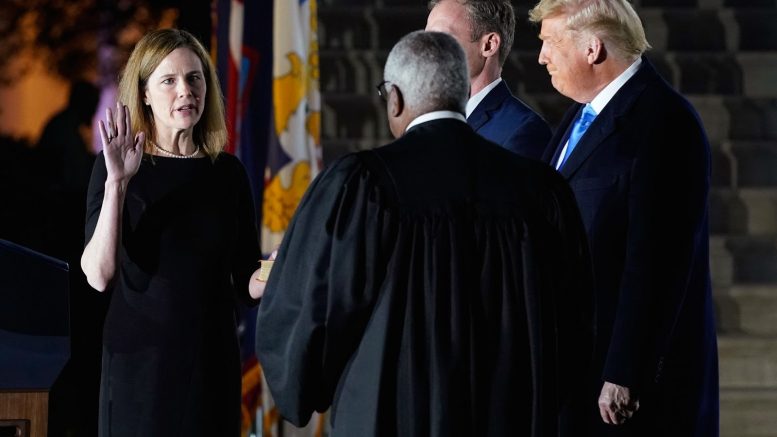The most recent addition to the US Supreme Court has secured a conservative future for the women of America that will likely undo progressive work done by the late Ruth Bader Ginsburg.
On Monday, the nomination of Amy Coney Barrett was confirmed in a 52-48 vote to be an Associate Justice for the Supreme Court of the United States of America.
The immediate recommendation for this 48-year-old Republican judge came from Majority Leader and Senator Mitch McConnell, with the urgent support of President Donald Trump, mere hours after the renowned champion of gender equality, Justice Ruth Bader Ginsburg, passed from pancreatic cancer in September.
McConnell faces extreme scrutiny as his rushed placement of Barrett came to fruition under textbook hypocrisy. In 2016, he moved at the same lightning speed to thwart President Barack Obama from filling a Supreme Court vacancy nine months before election day, claiming: “The American people should have a voice in the selection of their next Supreme Court Justice. Therefore, this vacancy should not be filled until we have a new president.”
The entire process of inaugurating Barrett took a little more than one month—not to mention one week before the most crucial presidential election in history while in the midst of a pandemic.
It was RBG’s dying wish for the Court to wait until the election was over for them to replace her.
Whilst a professor at the University of Notre Dame, Barrett belonged to a group who promoted anti-abortion resources: the University Faculty for Life. By the same token, she expressed her views in a university magazine saying: “Life begins at conception.”
“i’m SO pro life i’m willing to murder real human beings” https://t.co/4HYq0JylBd
— no context sitcoms ☮︎ (@oocsitcoms) October 27, 2020
She has previously written on the possibility of re-examining the precedent set by Roe v. Wade, a monumentous and historic case in 1973 that ruled the government has no business over a woman’s decision to terminate her pregnancy under the freedom of personal choice. The UK made abortions legal in 1967 under the British Abortion Act and are available with relative ease.
Further, Barrett and her husband have been longtime members of the People of Praise Christian Community–which used to refer to their female leaders as “handmaids” up until 2018, and has been under investigation for their abusive, authoritarian atmosphere.
RBG, on the other hand, had fought for women’s rights since the 50s when discrimination based on sex was dominant culturally and enshrined in legislation. She became the beacon of hope for women in a powerful court that swung right as she dissented case after case involving voting rights, education, workplace discrimination and contraceptive health care. She was the voice that upheld feminist standards in a world monopolised by men.
Professor Leigh Gilmore at the Ohio State University said in regards to Barrett: “Feminism is a liberatory movement comprised of people of all genders. Women who use their power to harm other women by reducing their rights and freedom are anti-feminist.”
Creating international outcry and infuriating many, this last grab of power by the Trump administration is projected to imbalance the ideological verdicts that will dictate American life for generations to come and influence other countries’ policies, especially considering that Supreme Court Justices serve for life and there is now a cemented 6-3 conservative majority.
Read in tandem: Poland has tightened its abortion laws… again
Words: Maelina Hassel | Subbing: Sara Guadrini

